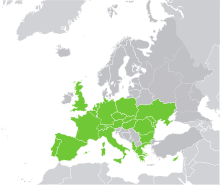Tephritis formosa
| Tephritis formosa | |
|---|---|

| |
| Tephritis formosa. Dorsal view | |

| |
| Side view | |
| Scientific classification | |
| Kingdom: | |
| Phylum: | |
| Class: | |
| Order: | |
| Family: | |
| Genus: | |
| Species: | T. formosa
|
| Binomial name | |
| Tephritis formosa (Loew, 1844)
| |

| |
| Range of Tephritis formosa in Europe | |
| Synonyms | |
| |
Tephritis formosa is a species of tephritid fly.[1] It is one of many species known commonly as gall fly.
Distribution
This species is found in most countries across Europe (Albania, Andorra, Austria, Balearic Islands, Belgium, United Kingdom, Ireland, Bulgaria, Czech Republic, France, Germany, Greece, Hungary, Italy, Malta, Republic of Moldova, Poland, Portugal, Romania, Slovakia, Spain, Switzerland, The Netherlands and Ukraine) and it also occurs in the Near East (Turkey, Caucasus, Israel and Iran).[2][3][4]
Habitat
These flies inhabit a wide range of habitats, but mainly prefer meadows, grassland and urban gardens where the host plants grow.[5]
Description

The adult male of Tephritis formosa is 4 to 5 mm long with wings about 4 mm long. The females are about 5 to 6 mm in length with wings of about 4 to 5 mm. The thorax and the abdomen are brownish. The head shows yellow-reddish eyes. The abdomen of the females ends in a tapered ovipositor, while it is rather rounded in males. The legs are yellowish. These small flies have light beige wings with large dark brown markings and small hyaline areas. The apical fork is missing. There are only some brown spots at end of veins R4+5 and M.[4][6][5]
Biology
The host plants for the larva are hawksbeards (Crepis virens),[4] cat's ear (Hypochaeris radicata) [4][7] and sow-thistle (Sonchus olearius, Sonchus aspera, Sonchus arvensis).[4][5][8]
Larvae invade the flower heads, causing galls to form.[5][9]
References
- ^ BioLib
- ^ Fauna europaea
- ^ Bisby F.A., Roskov Y.R., Orrell T.M., Nicolson D., Paglinawan L.E., Bailly N., Kirk P.M., Bourgoin T., Baillargeon G., Ouvrard D. Catalogue of life
- ^ a b c d e Murat KÜTÜK The Fauna and Systematics of the Genus Tephritis Latreille, 1804 (Diptera: Tephritidae) with a Key to the Species of Tephritis in Turkey
- ^ a b c d Nature Spot
- ^ Ebrahim Zarghani, Samad Khaghaninia, Reza Farshbaf Pour Abad and Babak Gharali SYNOPSIS OF THE GENUS TEPHRITIS LATREILLE (DIPTERA: TEPHRITIDAE) IN IRAN
- ^ Kutuk, M. (2005). "The fauna and systematics of the genus Tephritis Latreille, 1804 (Diptera: Tephritidae) with a key to the species of Tephritis in Turkey". Turkish Journal of Zoology. 30. Ankara, Turkey: The Scientific and Technological Research Council of Turkey: 345–356pp. ISSN 1303-6114.
- ^ George C. Steyskal [Keys to The Insects of The European Part of The USSR]
- ^ White, I. M. (1984). Tephritid Flies (Diptera: Tephritidea). Handbooks for the Identification of British Insects. Vol. 10 pt 5a. Royal Entomological Society of London. pp. 134 pp. ISBN 0901546682.
External links
